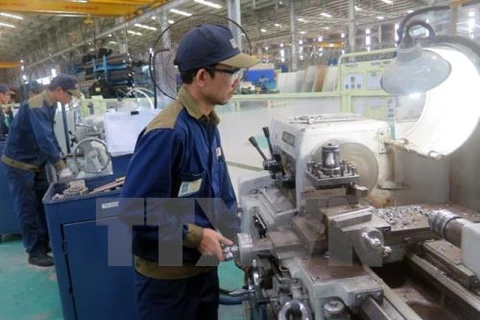Hanoi (VNA) - Hundreds of electronics manufacturers in Vietnam are having difficulty recruiting labourers, said an official from the Ministry of Labour, Invalids and Social Affairs (MOLISA).
Despite forecasts about automation technologies replacing manual labour, manual labourers are still in high demand at electronics manufacturers in Vietnam, especially those with skills and qualifications.
The number of electronics companies in Vietnam has risen drastically in the past decade, from 307 in 2006 to 1,165 in 2015 (up 16.3 percent per year), said Dr Chu Thi Lan, director of the Centre of Research Works on Working Environment and Conditions under MOLISA’s Institute of Labour Science and Social Affairs.
The number of electronics labourers has also risen drastically, from about 142,800 in 2009 to 453,200 in 2016, she said at a recent conference on securing jobs for workers at electronics companies in Vietnam.
“However, about 70 percent of these workers possess no qualifications for their jobs, and 80 percent of the companies are facing a severe shortage of skilled labourers,” Lan added.
New technologies are one of the factors leading to the shortage, said Dr Dao Quang Vinh, director of the Institute of Labour Science and Social Affairs.
“They require workers to adapt to big changes, increase competition, reduce manufacturing cost and build demand for more high-quality labourers,” he said.
Meanwhile, since the majority of Vietnamese labourers came from rural areas and did not receive any formal training for technological jobs, they lack flexibility in adapting to technological changes, said Dr Vu Quang Tho, director of MOLISA’s Institute for Workers – Trade Unions.
The harsh working conditions at manufacturing factories also lead some workers to quit their jobs, Tho added.
Nguyen Tien Tung, MOLISA’s chief inspector, said that wrong doings were discovered in 216 electronic companies in 2017 nationwide.
“All of these companies required their staff to work overtime, and 60 percent of them violated the regulations on overtime pay,” he said.
Twenty-seven enterprises made serious violations of the Labour Code and were fined 1.4 billion VND (61,600 USD), Tung added. Most of them did not ensure workers’ rights, he said.
To improve the situation, Dr Chu Thi Lan said electronics companies should shake up their practices, strictly comply with labour regulations, maintain labour standards and offer incentives to recruit labourers.
“They should absolutely avoid forced labour and child labour, and avoid firing workers over 35 years old,” she said.
Dr Dao Quang Vinh said that workers should receive training and re-training every time their companies acquire new technologies. “They should be aware of the change and prepared to gain new skills to meet new requirements,” he said.
The State should have policies that ensure job stability and on-the-job training for electronics workers, he added.
“In case they are not able to adapt to technological changes, these workers should be informed about other employment opportunities,” he said.-VNA
VNA
























